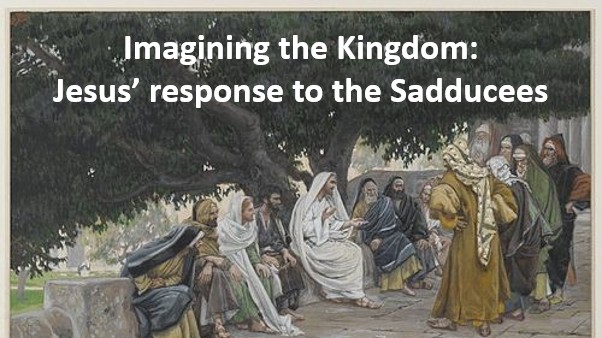This Sunday, the lectionary invites us to Ponder Luke 20:27-38. The English Standard Version extends the cluster to verse 40 and supplies the heading “Sadducees Ask About the Resurrection.”
The passage is the fourth of six accounts in chapter 20 about challenges to Jesus’ authority. The setting is the Temple in Jerusalem. The challengers are the Jewish authorities: the Chief Priests, Scribes, Pharisees, and Sadducees.[1]
Luke’s contribution to the Bible spans two books.
The first book is the gospel. The gospel begins with the birth of Jesus, tells of his life, and ends with his death and resurrection. Of the four gospels, Luke is most alert to the social and economic impact of Jesus.[2]
The second book, known as Acts, is a history of the churches formed after Jesus died, was resurrected, and returned to God.
In Acts, Luke responds to concerns of the Roman government about the massive impact the church had on society. In Thessalonica, the impact was so massive that a violent mob dragged some Christians to the town hall and publicly accused them of “turning the world upside down.”[3]
The authorities in Thessalonica, like authorities in other places, were deeply concerned about Christians. Because when people became Christians, they stopped conforming to practices which others considered vital to the well-being of society.
Christians were choosing to conform not to the norms of the day but to what was taught in churches. For example, Christians refused to burn incense to the Emperor, refused to attend public “games” which included feeding people to wild animals, refused to worship idols.
Christians chose to obey another authority, Jesus. They chose to obey rules Jesus set in his kingdom, the Kingdom of God.
Luke’s purpose in the book of Acts was to show that incidents of violence and protests involving Christians were not due to Christians choosing to dishonour the authorities or to harm others. Luke wanted to show that Christians were respectfully obeying a higher authority, Jesus.
And that’s what today’s account, is about. It’s about how to read and obey God’s word.
Remember, it’s set in the Temple and is a dispute with the Jewish leaders.
In the first of the six accounts, Jesus speaks about John Baptist, who persuaded people that Jesus, a man with authority, would soon come.
The second account is about a vineyard. This represents Israel, a people who were to establish a nation which honours God and his image in all persons. Jesus says Israel rejected God’s authority.
The third account is about Caesar’s authority. The Temple leaders tried to get Jesus to tell people to stop paying taxes to Caesar, a non-Jew. But Jesus deftly showed that the leaders were benefiting from the coins issued by Caesar, and Jesus didn’t criticize them for doing so.
The fourth account is today’s passage. It’s about Sadducees, members of a school of Biblical interpretation which gave prominence to the first five books of the Bible, the books of “law” attributed to Moses.
The Sadducees profited much from trading in animals used for Temple sacrifices, and trading in Temple currency. They didn’t accept belief in resurrection, life after death. They also didn’t accept belief in disembodied life, such as spirits and angels. They constantly argued about this with members of another school of interpretation, the Pharisees.
To undermine Jesus’ authority, they tried to trip him up, publicly. They knew Jesus accepted belief in resurrection. They tried to show that belief in resurrection is absurd. They put an absurd case to him:
A woman’s husband died before she bore any children. In conformance with Mosaic law, one of the husband’s six brothers married her, so that she could bear a child for her first husband, and the child could continue his line. But the second husband also died before she bore a child. And it continued so, until she had married all seven brothers, and all died, without her bearing any children. In the resurrection, which of the brothers will have her as wife?
In his response, Jesus gave a vital key for reading the Bible. He said we must use our imaginations. He said we mustn’t let our experience limit us. He said we must imagine a new age, an age in which there’s no giving or receiving of persons as if they are objects to be traded.
With that insight, we see why Luke wrote that the Sadducees said, “Moses wrote for us.”
The Sadducees used the Bible as light to justify paths of their own choosing. Jesus said we must regard the Bible as light which shows us new paths which we must follow.
Eternal life, or immortality, is not achieved through the transmission of our genes through our offspring. Women are not tools of procreation. Women and men are equally made in the image of God, equally called to many roles. This is why Jesus broke with the traditions of his day and included women among his followers.[4]
How do we use our Bibles?
Peace be with you.
[1] In the next chapter, Luke includes more of Jesus’ response to the challenges.
[2] Luke adopts the theme of “great reversal.” He speaks often of the marginalized, critiques wealth accumulation, of the powerful being brought down. He stresses that Jesus was executed as “king of the Jews.”
[4] Mary Magdalene, Joanna, and Susanna travelled in his entourage. Several women were at his crucifixion.
To learn more about Rama, click here.


